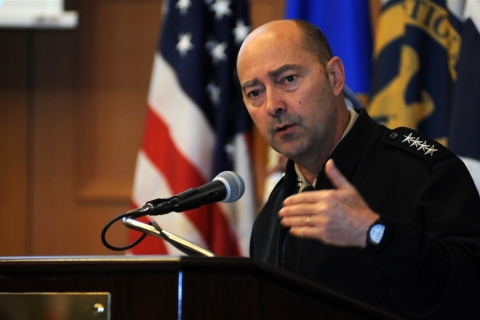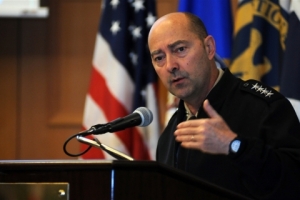Former Supreme Commander Tells VOA NATO Should Focus on Balkan Expansion
Former NATO Commander Admiral James Stavridis, the current dean of The Fletcher School at Tufts University, spent 30 years in the US Navy. Among his many commands were four years as the 16th Supreme Allied Commander at NATO, where he oversaw operations in Afghanistan, Libya, Syria, the Balkans and piracy off the coast of Africa.
In an interview with Voice of America’s Serbian Bureau's Jela De Franceschi, Admiral Stavridis covered a host of issues beginning with how the US and Russia found themselves in a new geopolitical confrontation.
What broke the relationship?
Frankly, the moment that really broke the relationship was the invasion of Georgia and the occupation of Abkhazia and South Ossetia. Since then, we have seen an additional series of disagreements culminating in a significant disagreement with the invasion of Ukraine and the annexation of Crimea. So we’re in very difficult situation with Russia today.
Is there a way forward?
If I were to give a prescription, it is that we should confront where we must but cooperate wherever we can...We should confront on the invasion of Ukraine and annexation of Crimea. That is a clear violation of international law. We should confront on Russian support of Syria for the Assad regime, which is clearly an illegal regime that is using barrel bombs and chemical weapons against its own population. On the other hand, we have area where we can cooperate - Counter-piracy, counter-narcotics, counter-terrorism, potentially on further arms control, perhaps in the Arctic. I think it is going to be a very mixed picture in terms of the relationship between Russia and the West.
Would you say that Russia has greater leverage over the situation than the West?
I think both sides have a certain amount of leverage. Russia derives leverage from the fact that they are in place. They are conducting an aggressive military action. They have been very loyal to the Assad regime and have experience working with Assad, so they have military and political leverage. On the other hand, the West has stronger economic leverage over Russia, particularly with the oil prices under USD 40 a barrel and continued sanctions on Moscow…I think there is room for maneuver in terms of a dialogue.
What about NATO’s expansion, is that on pause for now?
I think NATO expansion will continue; the Alliance has an open door policy for nations that are democratic or in a position to advance the interests of the Alliance. Montenegro will join at the Warsaw Summit, bringing us to 29 nations. I think next logical step is probably Macedonia; beyond that Bosnia-Herzegovina has some possibilities. Ultimately it would be good [for NATO] to consolidate the Balkans before doing any further expansion. I think there will be expansion, but it won’t be rapid, it will be a very time-phased approach.
VOA Serbian Service's Jela De Francesci.












